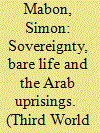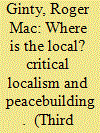| Srl | Item |
| 1 |
ID:
153140


|
|
|
|
|
| Summary/Abstract |
Five years after people took to the streets in protest at political organisation across the Middle East, the consequences of these actions remain. As the protests gained traction, states began to fragment and regimes sought to retain power, whatever the cost. While a great deal of focus has been upon what happened, very little attention has been paid to the role of agency within the context of the fragmenting sovereignty and political change. This article contributes to these debates by applying the work of Giorgio Agamben to the post-Arab Uprisings Middle East, to understand the relationship between rulers and ruled along with the fragmentation of the sovereign state. The article argues for the need to bring agency back into conceptual debates about sovereignty within the Middle East. It concludes by presenting a framework that offers an approach building upon Agamben’s bare life.
|
|
|
|
|
|
|
|
|
|
|
|
|
|
|
|
| 2 |
ID:
139229


|
|
|
|
|
| Summary/Abstract |
This article is primarily a piece of conceptual scoping and considers the concept of ‘the local’ in relation to peacebuilding. It notes how the local is simultaneously held to blame for conflicts (as unenlightened, dangerous, uncivilised) and is also regarded as a saviour for international peace support operations. Local legitimacy, partnership and ownership of international peace interventions are seen as a fast track to success, sustainability and exit. The article navigates its way around this confused understanding of the local and argues that the local is a (not always helpful) construction. It further argues that, by applying a critical lens towards the concept of the local, we can seek to separate the concept of the local from territory and see it in terms of activity, networks and relationships. This has implications for practice and ‘field’ work.
|
|
|
|
|
|
|
|
|
|
|
|
|
|
|
|